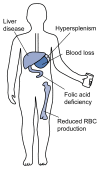The hematological complications of alcoholism
- PMID: 15706762
- PMCID: PMC6826798
The hematological complications of alcoholism
Abstract
Alcohol has numerous adverse effects on the various types of blood cells and their functions. For example, heavy alcohol consumption can cause generalized suppression of blood cell production and the production of structurally abnormal blood cell precursors that cannot mature into functional cells. Alcoholics frequently have defective red blood cells that are destroyed prematurely, possibly resulting in anemia. Alcohol also interferes with the production and function of white blood cells, especially those that defend the body against invading bacteria. Consequently, alcoholics frequently suffer from bacterial infections. Finally, alcohol adversely affects the platelets and other components of the blood-clotting system. Heavy alcohol consumption thus may increase the drinker's risk of suffering a stroke.
Figures



References
-
- Anton RF. The use of carbohydrate deficient transferrin during treatment and follow-up. Alcoholism: Clinical and Experimental Research. 1996;20(8):54A–56A. - PubMed
-
- Whelan G. Biological markers of alcoholism. Australian Journal of Medicine. 1992;22:209–212. - PubMed
-
- Ballard HS. Hematological complications of alcoholism. Alcoholism: Clinical and Experimental Research. 1989;13(5):706–720. - PubMed
-
- Ballard HS. Alcohol, bone marrow, and blood. Alcohol Health & Research World. 1993;17(4):310–315.
Publication types
MeSH terms
Substances
LinkOut - more resources
Full Text Sources
Medical
